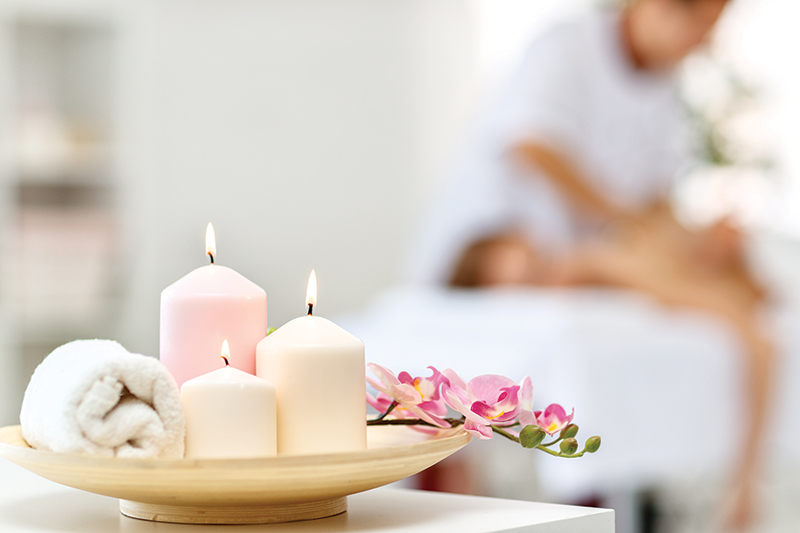Stress is perhaps more prevalent than ever in today’s fast-paced world—many of us experience some form of stress in our busy everyday lives. Emotional stress often results in physical stress, which can result in serious health conditions. Fortunately, there are a variety of resources available—including diet and massage therapy—that can help us to effectively manage stress.
Our Physical Responses to Stress
Cortisol (the “stress hormone”) plays an important role in our body, including managing the use of carbohydrates, fats, and proteins in the body; regulating blood pressure; increasing blood sugar; and regulating sleep cycles. As our bodies perceive a stress or threat, our adrenal glands produce and release cortisol into the bloodstream, providing a boost in energy that temporary increases heart rate, blood pressure, and tense muscles so we can handle the stressor. This is our natural “fight or flight” response, which is necessary to our survival. When the threat or danger has passed, cortisol levels typically decrease, causing heart rate and blood pressure levels to normalize.
However, experiencing stress on a regular basis can be detrimental. Chronically high cortisol levels can potentially result in a host of health concerns, including anxiety and depression, headaches, high blood pressure, heart disease, memory and concentration problems, digestion issues, difficulty sleeping, weight gain, muscle weakness, type 2 diabetes, increased inflammation, and osteoporosis. Other symptoms may include headaches, difficulty concentrating, and lowered immune function.
Choose the Right Foods
Fortunately, there are ways to help manage our cortisol levels and stress. According to dietician Courtney Barth, it is important to eat an anti-inflammatory diet, such as the Mediterranean diet. Incorporate lots of whole foods while avoiding processed foods. Stress-relieving foods include those which are high in Vitamin B (such as beef, chicken, eggs, organ meats, nutritional yeast), omega-3 fatty acids (such as avocados, chia seeds, olive oil, salmon, sardines, walnuts), magnesium (bananas, broccoli, dark chocolate, pumpkin seeds, spinach), and protein (almonds, beef, lentils, quinoa, salmon, shrimp, yogurt, kefir, pumpkin seeds). Magnesium aids in relaxation; there are also high-quality magnesium supplements that are effective for calming. Complex carbohydrates are rich in fiber, which helps to control blood sugar and therefore help balance cortisol levels. Fruits, starchy vegetables, whole and ancient grains, and legumes are good carbohydrate choices. It is also important to avoid or limit consumption of cortisol-increasing foods such as alcohol, caffeine, sugar, simple carbs (cakes, pastries, baked goods), and soda.
How Massage Therapy Helps
Regularly getting adequate sleep is vital to controlling stress, and engaging in relaxation activities such as meditation and yoga is beneficial as well. Interestingly, laughter has been scientifically proven to relieve stress—besides providing physical benefits (relaxing your muscles, improving cardiac health, boosting the immune system, lowering blood pressure, aiding in weight loss), laughter supplies mental health benefits as well (improving your mood, reducing cortisol in your body, increasing endorphins). And of course, getting regular exercise also helps to manage stress.
Research has shown that stress can be significantly reduced on both physical and psychological levels through receiving massage therapy. The American Massage Therapy Association (AMTA) website references various studies conducted between 1996 and 2004 in which all test subjects in the massage group showed significant changes in their emotional states and stress levels, indicated by a significant decrease in heart rate and blood pressure.
As noted in Psychology Today, the anxiety-reducing and mood-enhancing benefits of massage therapy are most likely related to decreased levels of cortisol and increased activity of the parasympathetic nervous system, which works to automatically calm the body and brain during times of stress. According to 2014 research by Tiffany Field, PhD, and published on the National Institutes of Health website, “When moderate and light pressure massage have been compared in laboratory studies, moderate pressure massage reduced depression, anxiety and heart rate, and it altered EEG patterns, as in a relaxation response. Moderate pressure massage has also led to increased vagal activity and decreased cortisol levels. Functional magnetic resonance imaging data have suggested that moderate pressure massage was represented in several brain regions including the amygdala, the hypothalamus and the anterior cingulate cortex, all areas involved in stress and emotional regulation.” In other words, the pressure from massage therapy directly benefits brain activity, heart rate, and cortisol levels.
The pace of the massage strokes applied is equally as important as the pressure. In addition to the application of moderate pressure, a slower-paced massage, low lighting, soft music, and aromatherapy can also provide a relaxing environment. Massage therapy has also been shown to improve sleep quality, which can then decrease cortisol levels.
We have several resources at our disposal to help manage stress in today’s world. Food alone may help reduce cortisol levels but will not have a significant impact long-term, unless it is combined with a whole-body approach, which includes exercise, adequate sleep, weight management, and massage therapy. In each of these areas, consistency is integral.
Kristina Mozzicato is a Licensed Massage Therapist and Board Certified in Therapeutic Massage & Bodywork by the NCBTMB. A 2009 graduate of the Connecticut Center for Massage Therapy, she is also certified in Cupping and ACE MediCupping™. The owner of Abundant Health Massage Therapy & Wellness in Farmington, CT, Kristina is currently pursuing a certificate in Holistic Nutrition and was named a Natural Nutmeg Magazine 10Best Massage Therapy Practitioner for 2020 and 2021.
For more information and convenient online booking, please visit: www.abundanthealthct.com.
